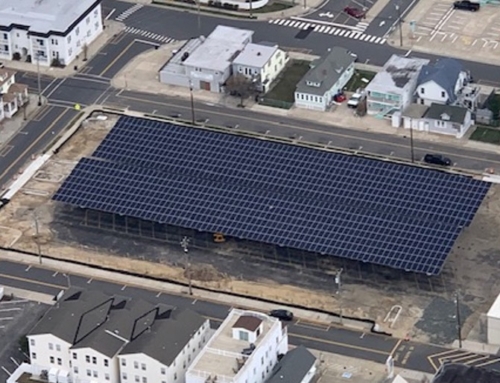How Does Solar Pay Off for Businesses?
Investing in a commercial solar energy system enables a business to generate revenue from their rooftop, unused property, or parking lot. The money saved from reduced energy costs can subsequently be reinvested into the business to drive growth and profits. This return on investment (ROI) makes solar energy a sound business decision, with short- and long-term financial benefits.
In the short term, solar panels enable businesses to greatly reduce or even eliminate one of their highest expenses: their electricity bill. Market data shows that a commercial property owner can reduce energy costs by 75% by going solar. In some cases, a solar installation can cover 100% of your business’s energy usage. Such an extreme reduction in monthly energy costs can be invested back into the business. You can scale up, add employees, buy new equipment, or make additional property improvements.
As the cost of energy varies in different parts of the country, businesses in parts of the US with the highest electricity costs will net more savings from converting to solar and thus, get a faster ROI.
Solar energy also pays off for businesses by stabilizing the cost of energy usage. The cost of commercial electricity in the US is rising faster than inflation. When you install a solar energy system, your business will no longer be subject to the consistently rising price of electricity. Your business will have a reliable source of energy for at least the next twenty-five to forty years.
What Determines My Return on Investment?
The ROI of solar panels for a business will depend on the following factors: the initial cost of the solar panels, the level of sun exposure, the energy needs of the business, incentives including tax credits and energy credits, and whether net metering is used.
The Initial Cost of the Solar Panel Installation
The cost of solar panel installation will vary from business to business due to differences in property size and energy needs. A popular misconception is that solar panels are extremely expensive to install. At one time, that was true, but since 2008, the cost has consistently been dropping, resulting in a 60% cost decrease to install a solar energy system. In addition, the US Department of Energy is committed to lowering the cost of solar energy another 60% over the next decade and has set the goal of driving down the cost per kilowatt-hour (kWh) from 4.6 cents to 2 cents/kWh by the year 2030.
In order to design the most efficient solar energy system for a property, Geoscape Solar takes your daily kWh usage and divides it by the peak sunlight hours for the space that your property has available for solar panels.
Funding
There are various ways to fund your solar energy installation. Geoscape Solar has a commercial finance team that will help you determine the right option for you, which can include leases, power purchase agreements, or purchase loans. Several options include no up-front costs and will yield immediate energy savings.
Level of Sun Exposure
The level of sun exposure does impact the levelized cost of electricity generated by large-scale commercial solar energy systems. But while areas that have more sun do have a lower overall cost of energy than those areas that experience less sun, you do not need to live in a warm climate to reap the benefits of solar.
Energy Usage of the Business
The amount of electricity that your business uses is a factor in the ROI of a commercial solar energy system. A small business solar array ROI differs from that of a medium-sized or large business solar energy installation because the property has a greater capacity for solar panels.
Incentives, Tax Credits, and Rebates
The 30% Federal Solar Investment Tax Credit is an attractive incentive for businesses considering investing in solar panels. Other incentives include state solar tax incentives and tax deductions. Available incentives combined can equal up to 75% of the cost of your solar energy system.
When Does Solar Pay Off for Businesses?
A common question that many business owners considering the installation of a solar array ask is: “How long will it take for solar energy to pay off for my business?” That answer is twofold because the benefits of solar energy come in both short-term and long-term financial gains. Short-term benefits include federal tax credits and an immediate drop in your business’ monthly cost of electricity. The long-term benefits of investing in solar energy can vary depending on how you pay for your installation.
Solar energy systems can pay for themselves within two to five years for business owners. By this time, they will have paid off their installation’s initial cost and now see a clear ROI, as the money that is no longer being spent on monthly electric bills can be reinvested into their business.
Solar Pays Off
An investment in a solar energy system is not a leap of faith; it’s just good business sense. Hopefully, this article has helped business owners realize that despite a few misconceptions, an investment in solar energy has a strong ROI for most businesses and organizations.
At Geoscape Solar, we help businesses utilize solar energy for profit. Your business will become energy independent, be able to decrease utility costs, and leverage available solar incentives for a quick ROI.
To discover how installing solar energy on your property will increase your business profitability, contact one of our energy specialists!


